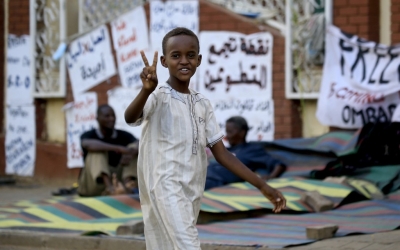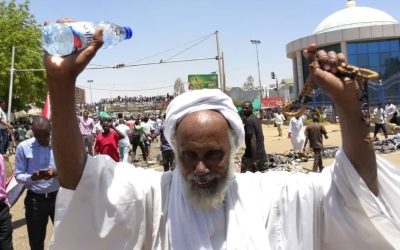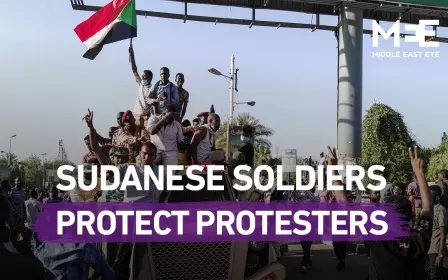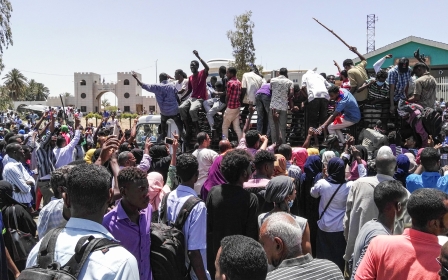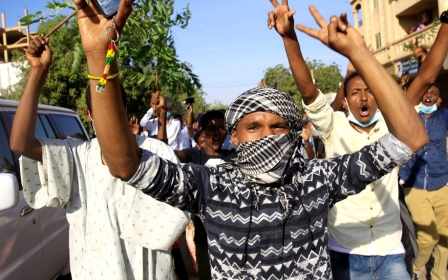Tear gas and gun fire outside army HQ as Sudan protests continue
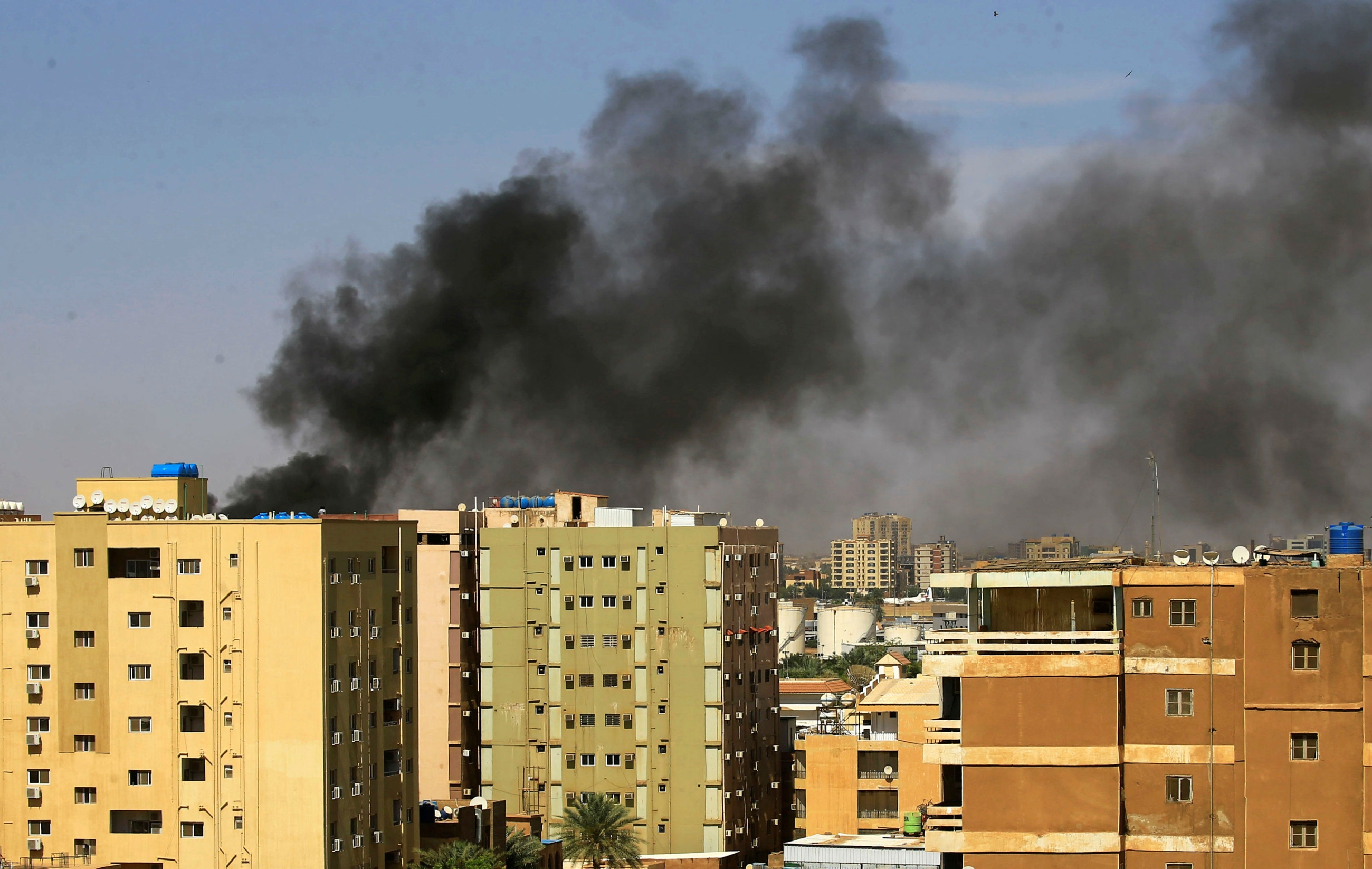
Sudanese security forces fired tear gas early on Tuesday at thousands of anti-government protesters who had been demonstrating outside the army headquarters in Khartoum for a third straight night, but soldiers intervened firing in the air, witnesses said.
Forces from the National Intelligence and Security Service (NISS), twice tried to break into the area using pickup trucks, witnesses said.
In an earlier attempt on Tuesday, navy troops intervened to protect demonstrators, a day after soldiers had shielded the protesters from the first effort to clear the sit-in, the Reuters news agency reported.
Why are Sudanese protesting against their government?
+ Show - HideSudanese protests have evolved in the space of less than six months from complaints about bread prices to calls for long-term leader Omar al-Bashir to go and demands for a civilian-led transition to democracy.
Here's a summary of the key moments so far since the protests began.
19 December 2018: People take to the streets in the city of Atbara to protest against a government decision to triple the price of bread, torching a local ruling party office. By the next day protesters on the streets of Khartoum and other cities calling for "freedom, peace, justice". Police try to disperse the crowds, resulting in at least eight deaths. Dozens more will be killed in the weeks of protest that follow
22 February 2019: Sudanese President Omar al-Bashir declares a nationwide state of emergency. He swears in a new prime minister two days later, as riot police confront hundreds of protesters calling for him to resign
6 April: Thousands gather outside the army's headquarters in Khartoum, chanting "one army, one people" in a plea for the military's support. They defy attempts by state security forces to dislodge them and troops intervene to protect them
11 April: Military authorities announce they have removed Bashir and that a transitional military council will govern for two years. Despite celebrations at Bashir's demise, protest leaders denounce the move as a "coup" and the protesters remain camped outside army headquarters.
14 April: Protest leaders call on the military council to transfer power to a civilian government
20 April: Sudan's military rulers hold a first round of talks with protest leaders
27 April: The two sides agree to establish a joint civilian-military ruling council, but talks stall over differences in the composition of the council, with both sides demanding a a majority
15 May: With negotiators reported to be close to agreeing a three-year transition to civilian rule, military leaders suspend talks and insist protesters remove barricades outside the army's headquarters. Talks resume on 19 May but break down again on 20 May, with the opposition insistent that a civilian must head the transitional governing body
28 May: Thousands of workers begin a two-day strike to pressure the military rulers and call for civilian government
3 June: At least 35 people killed and hundreds injured, according to opposition-aligned doctors, as security forces firing live ammunition move to disperse the protest camp outside army headquarters
4 June: General Abdel Fattah al-Burhan, the head of the military council, announces that all previous agreements with protest leaders are scrapped and says elections will be held in nine months
Thousands of protesters have massed at the complex in the capital since Saturday, urging the military to back them in demanding the resignation of President Omar al-Bashir and the formation of a transitional government.
It is the largest rally since protests erupted over a hike in bread prices in December, before transforming into nationwide demonstrations against Bashir's 30-year rule.
Stay informed with MEE's newsletters
Sign up to get the latest alerts, insights and analysis, starting with Turkey Unpacked
An estimated 3,000 protesters remained at the site on Tuesday morning, witnesses said.
'Inspectors of the revolution'
Reuters earlier witnessed dozens of young men blocking Nile Street, a main artery in the capital where ministries are located.
The protesters used scrap metal barriers to block traffic on the street, which is located around one kilometre away from the presidential palace.
Army soldiers on armoured vehicles were guarding the presidential palace but not moving against demonstrators, a witness said.
Men calling themselves "mabaheth al-thawra" - Arabic for "the inspectors of the revolution" - were checking ID cards before allowing pedestrians to pass through.
In a joint statement on Tuesday, the United Kingdom, United States and Norway said: "The time has come for the Sudanese authorities to respond to these popular demands in a serious and credible way.
"The Sudanese people are demanding a transition to a political system that is inclusive and has greater legitimacy... Failing to do so risks causing greater instability."
Members of the NISS and riot police fired tear gas at the protesters outside the complex on Tuesday, which also houses the defence ministry and president's residence, in an abortive bid to disperse the sit-in, protest movement organisers said.
"There was heavy firing of tear gas after which army soldiers opened the gates of the compound for protesters to enter," a witness told the AFP news agency on Tuesday.
"A few minutes later a group of soldiers fired gunshots in the air to push back the security forces who were firing tear gas."
A second witness also said soldiers had intervened against the security force agents.
An AFP correspondent, some five kilometres away from the complex, heard shooting for about four minutes.
Since the protests erupted in December, the armed forces had remained on the sidelines even as security agents and riot police have cracked down.
However, on Monday soldiers intervened for the first time to protect protesters from the security forces
'Wish of the revolution'
On Monday, Defence Minister General Awad Ibnouf vowed that the army would prevent any slide into chaos.
"Sudan's armed forces understand the reasons for the demonstrations and is not against the demands and aspirations of the citizens, but it will not allow the country to fall into chaos," Ibnouf said, according to the official SUNA news agency.
In a separate statement, army chief of staff Kamal Abdelmarouf said the military was "discharging its responsibility in securing and protecting citizens".
Officials say 38 people have died in protest-related violence since December.
Interior Minister Bushara Juma said seven protesters died and 15 were wounded on Saturday when forces tried to disperse them.
He said 42 security personnel were injured and 2,496 arrests made.
The umbrella group spearheading the protests appealed to the army on Monday for talks on forming a transitional government.
"We call on the Sudanese armed forces to talk directly with the Alliance for Freedom and Change for facilitating the peaceful process of forming a transitional government," said Omar el-Digeir, a senior member of the group.
Digeir said the protest organisers had formed a council to open talks aimed at agreeing a "transitional government that represents the wish of the revolution".
Reading from a statement, he also called on the armed forces "to withdraw their support for a regime that has lost its legitimacy" and to support the "people's alternative for a transition to a civilian democratic government".
Economic mismanagement
The rally outside the army headquarters has been the largest since protests began on 19 December in the central town of Atbara, quickly spreading to the capital and nationwide.
The European Union said an "unprecedented" number of people had come out calling for change since Saturday.
"The people of Sudan have shown remarkable resilience in the face of extraordinary obstacles over many years," the EU's External Action Service said.
"Their trust must be won through concrete action by the government."
The protesters accuse Bashir's administration of economic mismanagement that has led to soaring food prices and chronic shortages of fuel and foreign currency.
After a meeting chaired by Bashir on Sunday, Sudan's security council said the demands of the protesters "have to be heard".
Bashir, wanted by the Hague-based International Criminal Court on charges of war crimes and genocide connected with the suppression of a now 16-year-old ethnic minority rebellion in the western region of Darfur, took power in an Islamist-backed coup in 1989.
He has remained defiant, introducing tough measures that have seen protesters, opposition leaders, activists and journalists arrested.
Middle East Eye delivers independent and unrivalled coverage and analysis of the Middle East, North Africa and beyond. To learn more about republishing this content and the associated fees, please fill out this form. More about MEE can be found here.


